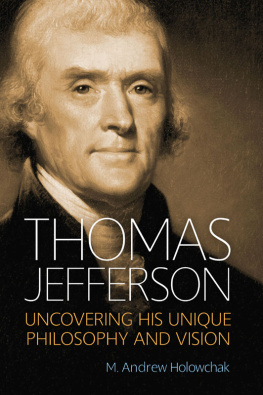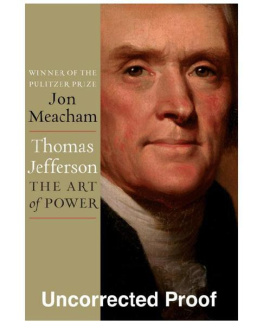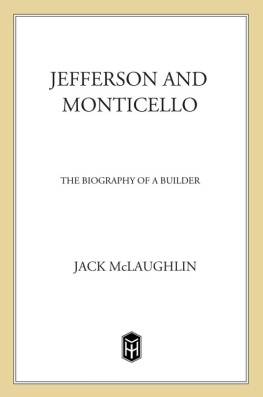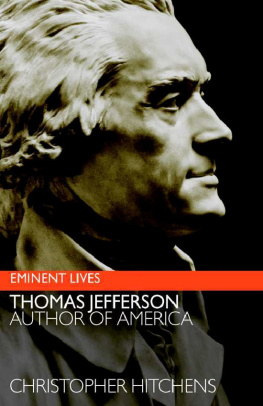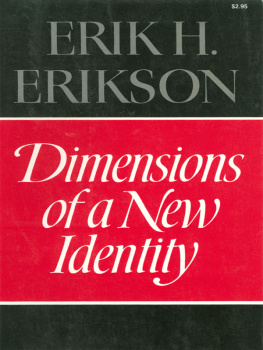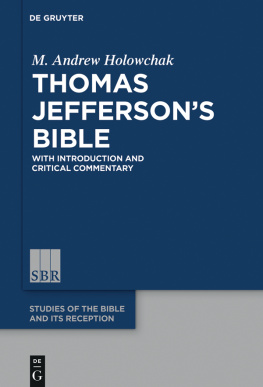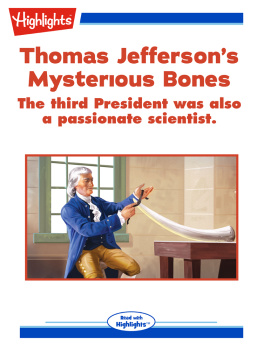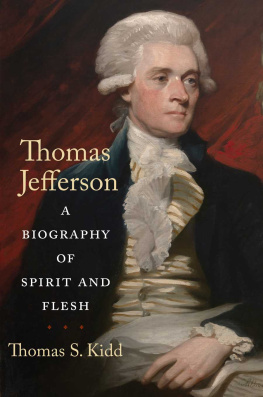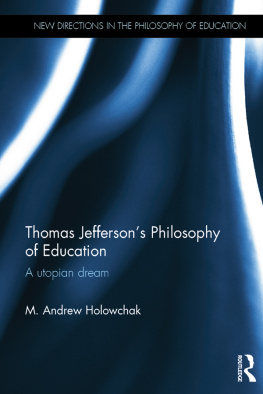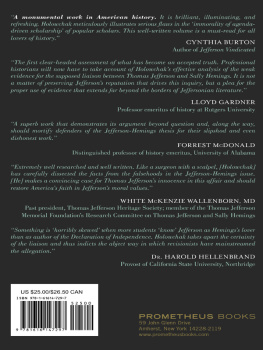

M. ANDREW HOLOWCHAK is adjunct assistant professor of philosophy at Rider University in Lawrence Township, New Jersey, and a part-time member of the Department of Philosophy and Religion at Rowan University in Glassboro, New Jersey. He is the author of Framing a Legend: Exposing the Distorted History of Thomas Jefferson and Sally Hemings; Dutiful Correspondent: Philosophical Essays on Thomas Jefferson; and many other books on philosophy, critical thinking, and psychoanalysis, along with numerous articles in scholarly journals. He is also the editor of Thomas Jefferson and Philosophy: Essays on the Philosophical Cast of Jefferson's Writings.
ALSO BY M. ANDREW HOLOWCHAK
Framing a Legend: Exposing the Distorted History of Thomas Jefferson and Sally Hemings

I like the dreams of the future better than the history of the past.
TJ to John Adams, August 1, 1816
John Adams, at the end of a letter to Jefferson (September 14, 1813), writes: Now, my Friend Jefferson, suppose an eternal self-existent being existing from Eternity, possessed of infinite Wisdom, Goodness and Power, in absolute total Solitude, Six thousand Years ago, conceiving the benevolent project of creating a Universe! I have no more to say, at present, he adds, as if to dismiss that notion as bunkum. In the closing paragraph of the letter, Adams adds: It has been long, very long a settled opinion in my Mind that there is now, never will be, and ever was but one being who can Understand the Universe. And that it is not only vain but wicked for insects to pretend to comprehend it.
Like Adams, Jefferson never professed to have much knowledge on matters of deity and the cosmos. Though there is no evidence that he ever willfully embraced atheism, he was reviled as an atheist by othersespecially by political opponents and no more than during the elections of 1800 and 1804. The reasons were chiefly three: he authored the Virginia Statute for Religious Freedom, deemed heretical; he championed French philosophy and science, deemed atheistic; and he wrote Notes on the State of Virginia, deemed heterodox. Nonetheless, Jefferson seemed consistently to be a believer in some sort of superior power that, at least, created the cosmos and set it to order. When the atheist descanted on the unceasing motion and circulation of matter through the animal, vegetable and mineral kingdoms, gifted with the power of reproduction, he writes thoughtfully years later to Adams (April 8, 1816), the theist, pointing to the heavens above, and to the earth beneath, and to the waters under the earth, asked, if these did not proclaim a first cause possessing intelligence and power.
This chapter is an introduction to Jeffersons philosophical thinking by introducing his cosmos. It comprises two sections. The first section concerns his physicalism. I begin with Jeffersons materialism and then go on to depict his idea of deitya material being that created the cosmos, set its parts in motion, and in some sense superintends it. The second section concerns his naturalism. I show how men in society differ from men in the state of nature. I then explicate Jeffersons notion of natural rights. Finally, I have something to say about how science, for Jefferson, enables humans to penetrate natures hidden modus agendi.
JEFFERSONS PHYSICALISM
Jeffersons physical universe is based on an empiricist epistemology, expressed neatly in a reply (August 15, 1820) to a letter of John Adams (May 12, 1820). He begins on assumption of the veridicality of sensory impressions: A single sense may indeed be sometimes deceived, but rarely: and never all our senses together, with their faculty of reasoning. The implications are that the senses work intimately with reason and that the totality of impressions gives reason information sufficient to guard against being mistaken, though reason is certainly not an infallible guide.
Jefferson then offers Adams a playful, Cartesian sketch of his epistemology.
I feel: therefore I exist. I feel bodies which are not myself: there are other existencies then. I call them matter. I feel them changing place. This gives me motion. Where there is an absence of matter, I call it void, or nothing, or immaterial space. On the basis of sensation, of matter and motion, we may erect the fabric of all the certainties we can have or need. I can conceive thought to be an action of a particular organization of matter, formed for that purpose by its creator, as well as that attraction is an action of matter, or magnetism of loadstone.
The use of feel and not think is intentional and in keeping with the thinking of philosopher Destutt de Tracy, Newtons aim throughout is not to wax epistemological or metaphysical. Given the axioms, corollaries, and lemmas of his system, the explanatory power of the system speaks for itself. Yet Jefferson, pace Newton, does not essay to give any details of bodily attraction. His aims are more banausic than metaphysical. He wishes to show that the existences in the universe are all material.
The physical universe of Jefferson is similar to that of the third-century BCE Greek philosopher Epicurus, of whom he claimed discipleship in a letter to American ambassador and longtime friend William Short (October 31, 1819). Everything comprises bodies and void, states Epicurus, for in every case, sense perception itself testifies that bodies exist, and it is because of sense perception that we must infer through reason what is non-evident. The existence of void-space is clear through reason, for bodies move and they must move in something. There is no room for any substance that is immaterial.
Jefferson is likewise an out-and-out physicalist. Perhaps with Epicurus in mind, Jefferson addresses the objection, made famous by Descartes, that thinking is due to some sort of immaterial substance. The mystery of matter, having the mode of action called thinking, is no more mysterious than the sun, having the mode of action called attraction, Jefferson continues in his letter to Adams (August 15, 1820). As attraction is a property of all bodies, so too thinking is a property all types of a certain kind of matter. That might prove puzzling, but it is much less puzzling than explaining how nonmatter can will and put matter in motion. He concludes boldly: To talk of immaterial existences is to talk of nothings. To say that the human soul, angels, god, are immaterial, is to say they are nothings, or that there is no god, no angels, no soul. I cannot reason otherwise. Matter is endowed by the creatora thinking material being, since no immaterial being can put matter in motion.
Though he claimed to be a disciple of the Greek philosopher Epicurus,
Jefferson, in contrast, was not a metaphysical atomist of the Epicurean sort, but a nominalist in the manner of the philosopher John Locke. He expresses his nominalism unequivocally in a letter to New Jersey politician Dr. John Manners (February 22, 1814):
Nature has, in truth, produced units only through all her works. Classes, orders, genera, species, are not of her works. Her creation is of individuals. No two animals are exactly alike; no two plants, nor even two leaves or blades of grass; no two crystallizations. And if we may venture from what is within the cognizance of such organs as ours, to conclude on that beyond their powers, we must believe that no two particles of matter are of exact resemblance. This infinitude of units or individuals being far beyond the capacity of our memory, we are obliged, in aid of that, to distribute them into masses, throwing into each of these all the individuals which have a certain degree of resemblance; to subdivide these again into smaller groups, according to certain points of dissimilitude observable in them, and so on until we have formed what we call a system of classes, orders, genera and species. In doing this, we fix arbitrarily on such characteristic resemblances and differences as seem to us most prominent and invariable in the several subjects, and most likely to take a strong hold in our memories.
Next page
